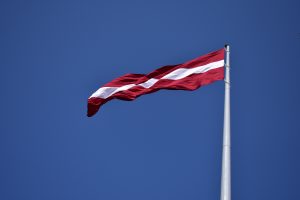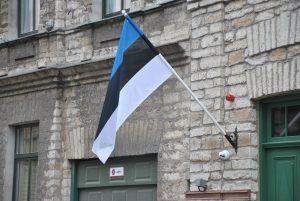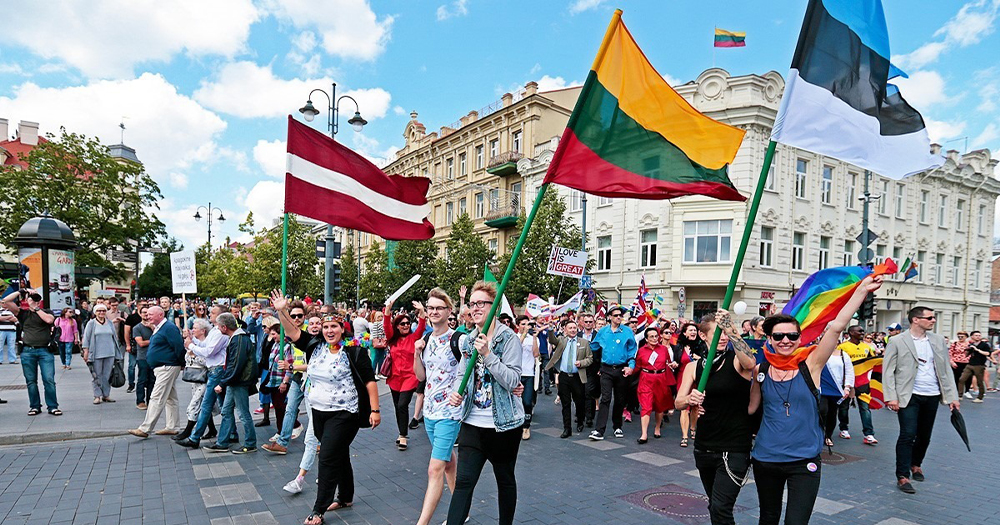On March 1st, to mark Zero Discrimination Day, the National LGBT Federation (NXF) – publishers of GCN – was invited by our Irish Embassies in the three Baltic States – Estonia, Latvia and Lithuania – to co-host a discussion on LGBTQ+ equality.
As befitting these pandemic times, the Zero Tolerance to Discrimination event was held virtually and brought together leading advocates from across the Baltic region who discussed the human rights landscape in their respective countries. This author was invited to represent the NXF and offer an Irish perspective on LGBTQ+ rights and what the Baltic countries may learn from a similarly small EU member state, but whose recent trajectory on equality issues has been a more positive one.
The situation in the three states remains a challenging one, not least due to the efforts of illiberal, far-right forces to attack and demonise LGBTQ+ communities. In Estonia, for example, the inclusion of a right-wing extremist party in a coalition government led to a planned referendum to insert a constitutional ban on marriage equality. The Estonian advocate also informed us that the party used its platform in government to launch what seemed like daily attacks on LGBTQ+ people. However, this increasing homophobic discourse also had the positive effect of galvanising those in the country supportive of equality and inclusion as reflected in opinion polls.

Thankfully, the governing coalition that included the far-right party collapsed recently, and, with it, the plan to hold a divisive anti-gay referendum. Estonian campaigners are now cautiously optimistic that the political climate has changed for the better and are especially eyeing legislation to improve same-sex partnership rights.
There was also cautious optimism from the Latvian and Lithuanian representatives. In 2019, Lithuania hosted Baltic Pride which passed without the kind of violence and disruption that has marred celebrations in previous years. Another positive was the election of an openly gay parliamentarian, who campaigned in full drag no less! Vytautas Raskevičius, whose party serves in the current Llithuanian government, has committed to seeking the repeal of a discriminatory law (“Protection of Minors”) that bears a striking resemblance to the widely condemned Russian anti-gay ‘propaganda’ legislation. It has also been compared to the notoriously homophobic ‘Section 28’ in the UK, which banned the ‘promotion’ of homosexuality in schools until 2003.
In Latvia, campaigners also believe the tide is slowly beginning to turn in their favour, with public support for various equality initiatives having increased in recent years. However, even securing very basic legal recognition for same-sex unions has proved difficult, with a majority of political parties voting against. In a boon for queer political visibility, the country’s Foreign Minister is an openly gay man.

For my part, I was keen to express solidarity with our Baltic friends and explain how rapid social transformation is possible. Until well into the 1990’s, Ireland was widely regarded as the most insular and socially conservative country in Western Europe, where abortion, divorce, and, of course, homosexuality, were all illegal. But as the country began to prosper economically and the strangle-hold of the Roman Catholic Church loosened, significant change followed, culminating in the country becoming the first in the world to popularly endorse equal marriage rights for same-sex couples. I was also keen to stress how our membership of the European Union has been absolutely central to Ireland’s social progress and modernisation.
We were all in agreement that Europe, now more than ever, needs to robustly defend its values against the spectre of authoritarianism that is especially evident in Poland and Hungary, where, unsurprisingly, anti-LGBTQ+ prejudice has been to the fore of their government’s assaults on democracy and the rule of law. And while there may be a temptation to talk of a dividing line between ‘Western Europe’ and ‘Eastern Europe’ on such matters, the reality is that we have no room for complacency here in Ireland, as those same far-right actors are busily organising and using the current Covid-19 pandemic to sow misinformation and fear as part of their destructive agenda.

Marc Angel MEP, Co-Chair of the European Parliament’s LGBT Inter-Party Group, also offered his observations in the Q&A session, where he informed us of an upcoming discussion they are hosting on the deteriorating situation in Poland and Hungary. He also warned about the need for vigilance against an increasingly vocal and organised anti-Trans movement across Europe and to not let them divide our community.
Finally, it was left to all of us to thank our Irish Embassies for organising a most interesting and informative Zero Tolerance to Discrimination event.
A welcome, practical example of Ireland’s stated commitment to use its foreign policy as an instrument to support LGBTQ+ rights globally.
Adam Long, Advocacy and Communications for the NXF,
© 2021 GCN (Gay Community News). All rights reserved.
Support GCN
GCN is a free, vital resource for Ireland’s LGBTQ+ community since 1988.
GCN is a trading name of National LGBT Federation CLG, a registered charity - Charity Number: 20034580.
GCN relies on the generous support of the community and allies to sustain the crucial work that we do. Producing GCN is costly, and, in an industry which has been hugely impacted by rising costs, we need your support to help sustain and grow this vital resource.
Supporting GCN for as little as €1.99 per month will help us continue our work as Ireland’s free, independent LGBTQ+ media.
